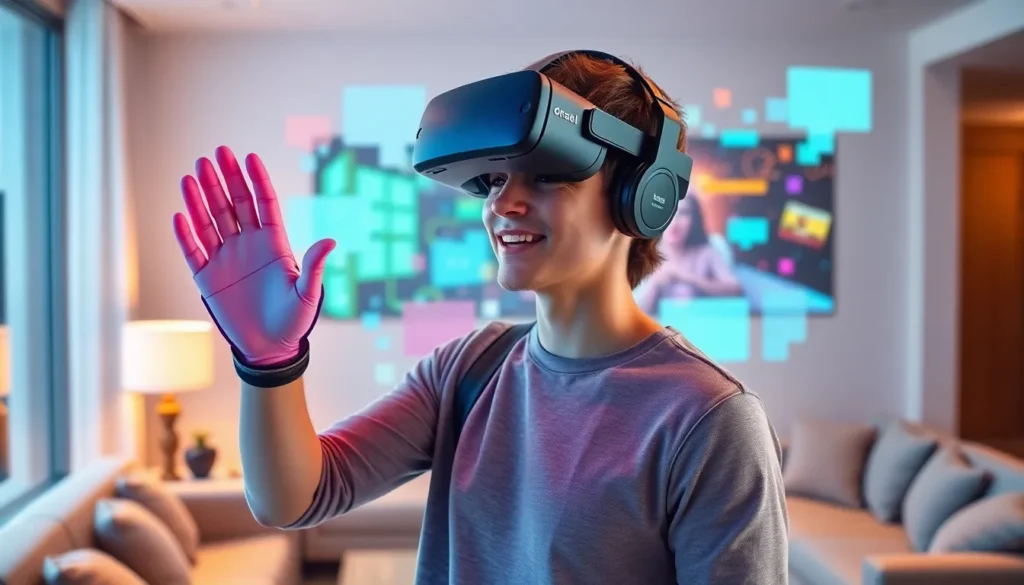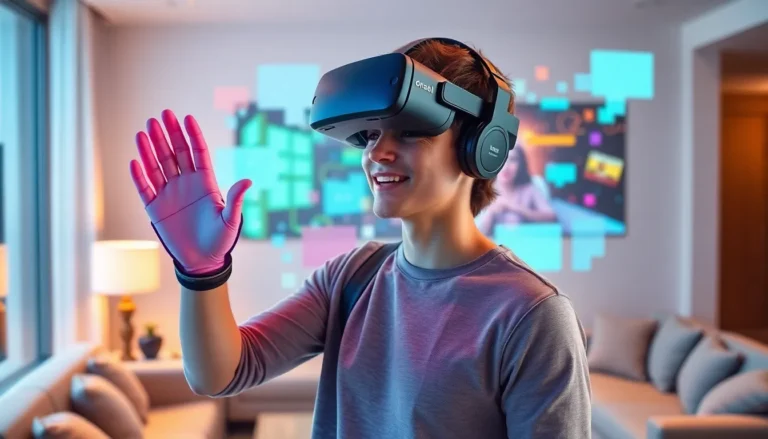Table of Contents
ToggleVirtual reality technology services are transforming the way businesses engage with their audiences. Imagine stepping into a world where your clients can experience your products before they even hit the shelves. It’s like giving them a backstage pass to the future, minus the awkward small talk.
Overview of VR Technology Services
Virtual reality technology services transform how businesses connect with customers. Through immersive experiences, clients can explore products before making purchases.
Definition of VR Technology Services
VR technology services encompass a range of applications that utilize virtual reality environments. These services include 3D modeling, simulation training, and virtual product showcases. Various industries, such as real estate, retail, and healthcare, leverage these offerings to enhance engagement and provide unique customer experiences. The technology enables users to interact with products and environments in a lifelike manner, fostering deeper connections. By integrating VR solutions, companies can create tailored experiences that resonate with target audiences.
Importance in Today’s Market
Today’s market relies heavily on VR technology services for competitive advantage. Businesses adopting VR can increase customer engagement by up to 70%, according to industry studies. Companies utilize VR to offer realistic previews, improving satisfaction and reducing return rates. In addition, immersive experiences capture consumer attention, leading to higher conversion rates. Brands that invest in VR technology position themselves as innovators, attracting tech-savvy customers. Moreover, the growing popularity of VR experiences enhances brand loyalty, making these services crucial for long-term success.
Types of VR Technology Services
Various VR technology services exist to meet diverse needs across industries. These services enhance customer interaction and engagement through immersive experiences.
Custom VR Development
Custom VR development tailors virtual environments to specific business requirements. Companies can create unique simulations that align with operational goals. Development includes designing scenarios for training or showcasing products. In real estate, for instance, virtual tours allow potential buyers to explore properties from anywhere. Customization fosters a distinct brand identity and enhances user experiences.
VR Content Creation
VR content creation involves producing immersive experiences for various applications. This service encompasses creating 3D models, interactive narratives, and audio-visual elements. Engaging content can educate, entertain, or inform users depending on the intended message. Retailers benefit from high-quality product visualizations that allow customers to interact with items virtually. Content that resonates with audiences can drive customer engagement and increase sales potential.
VR Consulting Services
VR consulting services guide businesses in integrating virtual reality into their strategies. Experts assess the current operational landscape and identify potential VR applications. By understanding specific needs, consultants recommend tailored solutions for training, marketing, or customer engagement. In healthcare, consultations help develop simulations for medical training or patient education. These services enable businesses to harness VR’s full potential, maximizing benefits for customers and stakeholders alike.
Applications of VR Technology Services
VR technology services transform various industries by enhancing experiences and improving engagement. Key applications include healthcare, education, and entertainment.
Healthcare Industry
The healthcare industry benefits significantly from VR technology services. Medical professionals utilize VR simulations for training, allowing them to practice procedures in a risk-free environment. Patients engage in virtual therapy sessions, effectively reducing anxiety and pain. Studies show these applications enhance patient outcomes and increase procedural accuracy by over 30%. Finally, medical facilities showcase their offerings through virtual hospital tours, simplifying decision-making for patients.
Education and Training
VR technology services revolutionize education and training methods. Students can explore historical sites or conduct virtual science experiments without leaving the classroom. Trainers access realistic simulations, allowing for hands-on practice essential for skill acquisition. Data indicates that VR enhances knowledge retention by up to 80%, making learning more effective and enjoyable. Institutions leveraging VR create immersive learning environments that foster collaboration and engagement among students.
Entertainment and Gaming
The entertainment and gaming sectors experience a remarkable transformation through VR technology services. Gamers immerse themselves in lifelike worlds, enhancing their gaming experiences significantly. Movie studios use VR for promotional content, providing audiences with interactive trailers and behind-the-scenes tours. The global VR gaming market is projected to reach $45 billion by 2025, reflecting the growing consumer interest in engaging content. Entertainment companies embracing VR attract new audiences while enriching current ones, setting themselves apart in a crowded marketplace.
Benefits of Utilizing VR Technology Services
Virtual reality technology services offer numerous advantages, enhancing business operations and customer interactions.
Enhanced User Experience
Immersive VR experiences provide a unique level of engagement for users. Clients interact with products in realistic environments, leading to increased satisfaction. Enhanced visualizations help customers understand complex concepts or products better. Engaging storytelling within VR encourages emotional connections, ultimately driving higher conversion rates. Brands that prioritize user experience through VR stand out in crowded markets.
Cost-Effectiveness
Investing in VR can lead to significant cost savings for businesses. Companies often reduce the need for physical prototypes or expensive marketing campaigns, allowing for reallocation of resources. VR training simulations cut training costs while providing effective and adaptable learning environments. Such savings can improve overall return on investment when adopting VR technology. Long-term financial benefits emerge from fewer product returns and enhanced customer loyalty.
Innovative Solutions
VR technology services foster innovation across various industries. Businesses that utilize VR can explore new marketing strategies that captivate potential customers. Custom applications enable tailored experiences that align with specific operational goals. Enhanced collaboration emerges through virtual workspaces, making remote teamwork more effective. Companies that embrace VR stand at the forefront of technological advancement, setting themselves apart from competitors.
VR technology services are reshaping how businesses connect with their customers. By immersing clients in virtual experiences, companies can significantly enhance engagement and satisfaction. The diverse applications of VR across various industries illustrate its versatility and potential for innovation.
As brands continue to invest in these services, they position themselves as leaders in their fields, attracting a tech-savvy audience and fostering loyalty. Embracing VR not only streamlines operations but also opens doors to new marketing strategies and collaborative opportunities.
The future of customer interaction is undoubtedly linked to the advancements in VR technology, making it an essential component for any business aiming for long-term success.







